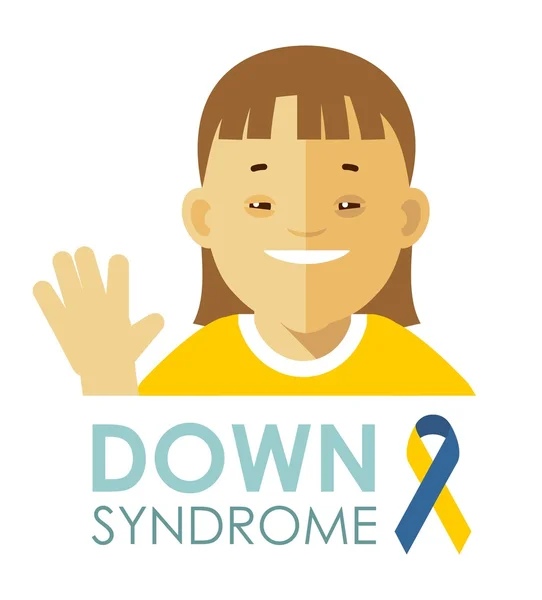Most of us have seen or know a child with Down’s syndrome. Whether it is on the road, in our homes or on TV, we will have noticed the characteristic facie: flat nasal bridge, slanting eyes, small mouths and smaller ears. Not all will have all these features, but the majority have a face that is easily recognisable and most times, lovable.
Last year, I was at the airport in Abuja when I met someone who changed the way I look at people with special needs. I had just finished praying at the make-shift female section of the mosque at the departure lounge when a short woman came in pushing an elderly woman in a wheel chair. The younger woman hurriedly wore her hijab and positioned herself and the older woman in preparation for prayer. My curiosity was piqued when I noticed that the younger, shorter woman had down’s syndrome and looked to be in her forties. When the couple finished praying, the younger woman told the woman in the wheelchair that she was going to buy them something to eat. She then turned her slanted eyes at me and asked shyly if I wanted something too. I politely declined.
By now, my story-telling senses were thoroughly stimulated and so I inched closer to the old woman and greeted her warmly.
Most old people like company and before long she was telling me her life story. I asked if we were on the same flight. No, she and her daughter were headed to Sokoto. She lived there with her only daughter. She had come to Abuja to visit her son who recently had surgery. She was in a wheel chair because of her bad knees- osteoarthritis. I calculated that she would be in her seventies and she confirmed that by telling me about PMB’s first era as president.
And yes, her forty-two-year-old daughter who had down’s syndrome was now her primary care giver.
I was thoroughly impressed.
Her daughter returned with a tray filled with food and sat down next to her mother. Between the two of them, they narrated a story of strength, stigma and the herculean love between a mother and her child.
When Maryam* was born, her mother was overjoyed. She had given up all hope of having another child after her son who was born some fifteen years earlier. She was in her forties and had resigned to having an only child when she started gaining weight and was told by a nurse that she was pregnant. So happy was she that she kept the news to herself for fear of ‘evil eye’. She told no one except her husband who did not believe her at first. Maryam’s mother stayed indoors and reduced social interaction with her family until she gave birth to her daughter. Her baby cried weakly at birth and was said to be frail by the midwife. Her limbs were ‘weak’ but she appeared to be healthy. Maryam’s mother was content to wrap her on her back all day while did her chores. The baby was very peaceful and smiled at every opportunity.
Maryam’s developmental milestones were however delayed. Neck control which is the ability of babies to hold the head is usually achieved between two to three months. Maryam’s head still rolled at five months. This translated to a delay in sitting down (usually achieved at six months). Fear began creeping into the heart of Maryam’s mother- who was responsible? Which of her co-wives could do such an evil thing? She went to her Mallam (code word for marabout) for answers.
You see, in a polygamous setting, nothing bad happens except that it is a co-wife’s fault.
Gradually, Maryam achieved neck control at 10 months and by the time she turned one, she could sit without support. With her husband’s encouragement they went to the hospital where she was counselled about her child’s condition. Maryam’s mother had never heard of Down’s syndrome and did not want to believe that her beautiful, peaceful baby had a condition that could not be cured. She rejected the idea and cried for days. She was not willing to accept that there was no cure until she sold all her livestock, jewellery and furniture chasing local marabouts and mallam’s in Nigeria.
Amidst laughter, she narrated how she once travelled to Maradi, in Niger republic, with two-year-old Maryam on her back against her husband’s wishes. The mallam demanded that she bring a ram for sacrifice or its equivalent in cash. He would buy the ram and sacrifice it on her behalf while his students would pray for Maryam’s speedy recovery. Unfortunately, the money on her was not enough for a ram so she promised to travel back and return with the full amount. Two weeks later, she returned to Maradi and the mallam said the money was not enough because he would need two rams now, not one. Desperate for a solution as the mallam came highly recommended, maryam’s mother borrowed from her brother and returned the next day to give him the amount for two rams.
Do you know what happened? When she went to the house, malam was said to be having his bath and so one of his children offered to take her to greet his wife. The house was filled with people and it looked like a celebration of sorts was going on. Apparently mallam’s wife had delivered twins and that was the day of the naming ceremony. The wife innocently told Maryam’s mother that she was waiting for mallam to go to the market and purchase their two rams for the naming ceremony. Realization hit Maryam’s mother’s like a ton of bricks. Her rams were to be used for a naming ceremony! She had been conned!
Maryam started walking and talking at three and a half years and gradually became self-reliant. She was always by her mother’s side and never gave her any trouble. Even when maryam’s father died years later, it was Maryam who cried with her and held her close at night. Maryam’s older brother insisted Maryam be put in school so that she could be literate.
Here Maryam narrated herself, how school terrible school was. She told me in a flat tone how the other children called her names like ‘wawiya’ and did not play with her. Her mother complained to the school numerous times but nothing changed. Maryam went to six different primary schools before her mother decided to take matters into her own hands. With financial help from her older son, a private tutor was employed who came in the evenings to teach Maryam at her own pace. At the age of fourteen, Maryam could read and write, although a bit slowly. She could solve simple arithmetic problem and even memorised some chapters of the quran. Her mother was so proud.
At nineteen, Maryam discovered her talents in weaving the traditional men’s caps popularly known as ‘Zanna’. This helped her creatively and financially. She also learnt how to sew. Her mother was determined that no one would take advantage of her or her daughter ever again. Men began sniffing around Maryam in her late teens but she was skeptical. In her honest and simple nature, Maryam would tell her mother that the men would say they liked her but only if she would accompany them ‘somewhere’. A particular man was even bold enough to attempt to fondle her breasts when he came for ‘zance’ at maghrib. Maryam’s mother went to his home and gave him a piece of her mind. He never came back again.
The Maryam I met was a simple beautiful girl with a lovable nature. She had made her peace with the world. Her mother suffered severe knee pain and so had been unable to walk for four years. Now it was Maryam, who carried her to the bathroom, bathed her and clothed her. It was Maryam who cleaned up after her and it was, she who would stay up at night with her listening to her stories when insomnia creeped up on the old lady.
The old lady (Hajia) said to me, imagine if Maryam had been born normal? She would be married with her own family by now and I would be alone, begging for relatives to live with me. With Maryam, I have love, contentment and consider myself the luckiest among all my friends and siblings. Allah knows why he gave me Maryam, and for that, I am truly grateful.
His ways they say, are not our ways. We learn every day.

 Join Daily Trust WhatsApp Community For Quick Access To News and Happenings Around You.
Join Daily Trust WhatsApp Community For Quick Access To News and Happenings Around You.

